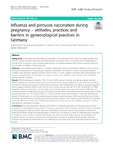Influenza and pertussis vaccination during pregnancy – attitudes, practices and barriers in gynaecological practices in Germany
Böhm, Stefanie
Röbl-Mathieu, Marianne
Scheele, Burkhard
Wojcinski, Michael
Wichmann, Ole
Hellenbrand, Wiebke
Background
In Germany, antenatal influenza vaccination is recommended since 2010, but uptake remains low. Several countries recently introduced antenatal pertussis vaccination, which is currently under consideration in Germany. We conducted a survey among gynaecologists on attitudes, practices and barriers regarding influenza and pertussis vaccination during pregnancy.
Methods
Gynaecologists were invited to complete a pre-tested, 24-item questionnaire published in the German Professional Association of Gynaecologists’ journal in September 2017 within 2 months. Associations between variables were examined using Chi-Squared, Fischer’s Exact or t-tests. Variables associated with gynaecologists’ self-reported implementation of vaccination in pregnant women were identified using univariate and multivariate logistic regression analyses.
Results
Of 867 participants (response 11%), 91.4 and 59.4% reported currently vaccinating pregnant women against influenza and pertussis, respectively. Gynaecologists who reported obtaining annual influenza vaccination and actively informing their patients about these vaccinations were significantly more likely to vaccinate pregnant women against influenza (96.5% vs. 65.7 and 95.1% vs. 62.2%) and pertussis (63.1% vs. 44.3 and 82.4% vs. 12.9%). Performing influenza vaccination was least likely among gynaecologists who perceived logistical difficulties as a vaccination barrier (35.9%), while pertussis vaccination was least likely if the lacking official recommendation (32.0%), logistical difficulties (27.1%), safety concerns (17.5%) and limited vaccine effectiveness (11.1%) were perceived as barriers. Of participants not yet vaccinating pregnant women against pertussis, 86.5% reported they would follow an official recommendation. Including vaccination recommendations in the maternity record (95.2%) and informing the public (88.7%) and health care professionals (86.6%) were considered the most suitable measures to achieve high pertussis vaccination coverage.
Conclusions
The large proportion reporting performance of influenza vaccination during pregnancy and high acceptance of a potential recommendation for pertussis vaccination reflected positive attitudes towards vaccination among participants. However, factors associated with failure to vaccinate may be more prevalent among non-participants. Results suggest that gynaecologists’ confidence in vaccination is crucial for implementing vaccination in pregnancy. Thus, doubts on vaccine effectiveness and safety should be allayed among gynaecologists and pregnant women via various communication channels, and solutions for logistical barriers sought. Including antenatal vaccination recommendations in the maternity record would serve as an important reminder for both groups.
Dateien zu dieser Publikation

